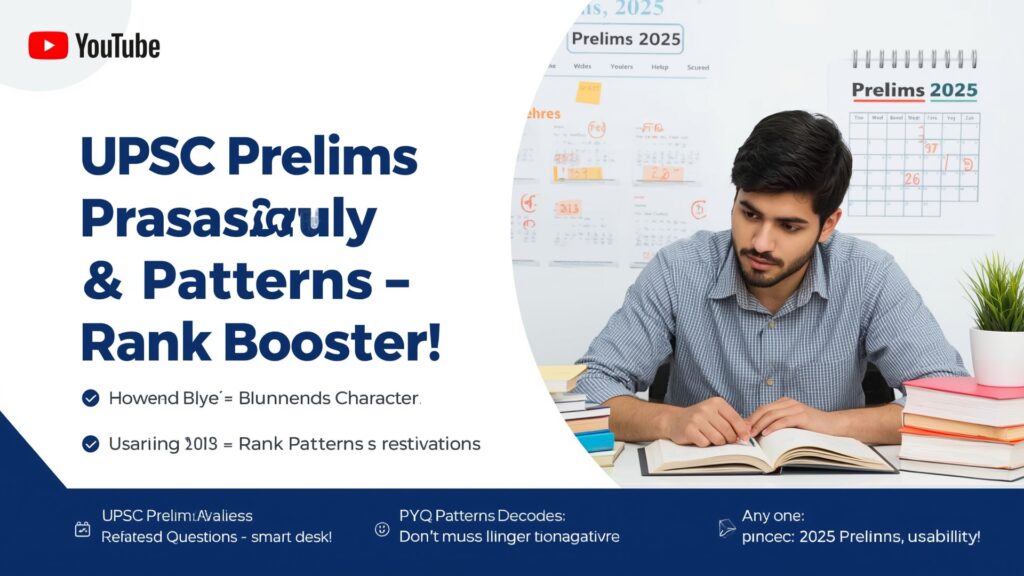Every UPSC aspirant has been told to “work smart, not just hard.” But in the ocean of books, current affairs, and coaching materials, what exactly does smart work mean?
If you ask me, one of the most underrated yet game-changing strategies is understanding the UPSC Prelims Repeated PYQs & Patterns. This one habit can completely change the way you prepare.
Why PYQs Aren’t Just Past Papers
UPSC Prelims Repeated PYQs & Patterns:
Here’s the thing: most of us solve previous year UPSC prelims questions just for practice. But if you start noticing repeated topics in UPSC prelims, you’ll realize that UPSC has a habit. It revisits certain subjects, frames similar questions in a new way, and focuses again and again on some specific themes.
And I’m not saying this lightly. I’ve spent weeks just doing UPSC prelims PYQ analysis—manually. And guess what? Questions around environment, history (especially modern), and polity have shown recurring patterns year after year.
UPSC Prelims Repeated PYQs & Patterns
Top High Yield Prelims Topics UPSC 2025 – Your Shortcut to Success
Cracking the Code: What Patterns Really Look Like
UPSC Prelims Repeated PYQs & Patterns: Most coaching institutes just dump questions on you. But patterns? They don’t always come in a template. It’s more subtle than that.
For instance, instead of repeating a question word-for-word, UPSC often changes the angle. Let’s say they asked about “Fundamental Rights” in 2019. In 2021, they might ask a situation-based question related to the same Article. That’s what I mean by UPSC prelims question patterns.
Over the last 10 years, I’ve seen similar UPSC repeated questions prelims being re-framed—some more than twice. And I’m not alone. Most toppers I’ve spoken to admit that PYQ-based strategy for UPSC prelims gave them a massive edge.
How to Find Repeated Questions in UPSC Prelims (Without Losing Your Mind)
UPSC Prelims Repeated PYQs & Patterns: Here’s what worked for me:
Download UPSC prelims papers from the last 10-12 years.
Go subject-wise—start with Polity and move on to History, Economy, and so on.
Create a list of questions that feel familiar or related.
Tag them as “direct repeat”, “theme repeat”, or “concept repeat”.
That’s how I started seeing the most repeated questions in UPSC prelims. And trust me, the pattern is real. The repetition isn’t lazy—it’s strategic. It’s testing your conceptual clarity.
The Truth About “Predictable” Questions
Now you might be wondering, “Isn’t UPSC unpredictable?” Well, yes and no.
While no one can predict exact questions, there are UPSC prelims predictable questions that come from high-frequency topics. Like National Parks. Like Government Schemes. Like Buddhist Councils. These aren’t guesses—they’re part of a pattern.
In fact, the more you study UPSC Prelims Repeated PYQs & Patterns, the more obvious it becomes. It’s almost like decoding UPSC’s brain.
What the Trends Tell Us
Let’s talk about prelims question paper trends. In the past few years:
Environment-based questions have gone up, especially post-2014.
Ancient and Medieval History have reduced, but Art & Culture stays strong.
Current Affairs questions are becoming more indirect—linked to static knowledge.
So, when someone asks you to guess the trend, don’t just look at one year. Do a 5-year sweep and analyze the UPSC prelims question patterns over time. You’ll notice the shift.
My Take: Why This Strategy Actually Works
Before I started focusing on UPSC repeated questions prelims, I was all over the place—reading everything under the sun. But after I built a PYQ-based strategy for UPSC prelims, I started scoring more in mocks and had better clarity.
Repeated practice with PYQs also trains your brain to read faster, eliminate options smartly, and stay calm under pressure. It’s the kind of preparation UPSC quietly rewards.
And here’s a bonus: once you learn how to find repeated questions in UPSC prelims, you also become better at judging what won’t come. That saves time, energy, and a lot of confusion.
Final Thoughts (from Someone Who’s Been There)
If I had to prepare for prelims all over again, I wouldn’t start with NCERTs. I’d start with UPSC Prelims Repeated PYQs & Patterns.
They tell you what the exam expects, what it values, and where it’s going. The rest of your preparation can then be built around that.
So, whether you’re a first-timer or a repeater, don’t ignore the power of PYQs. They’re not just practice—they’re prediction tools. Use them well.
Now it’s your turn: Open a question paper, and instead of solving it, study it. Read between the lines. Ask, “Why this question?” Do that enough times, and trust me—you’ll be ahead of 80% of aspirants.



